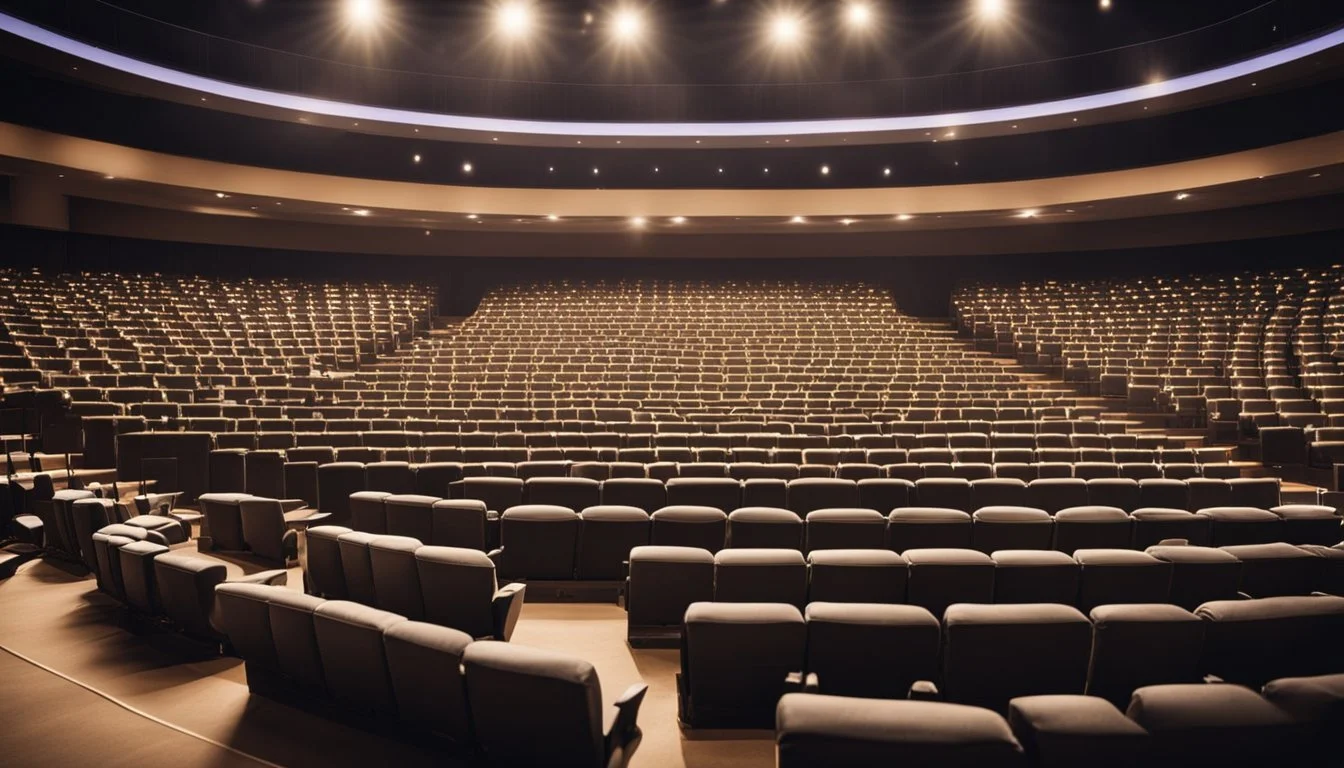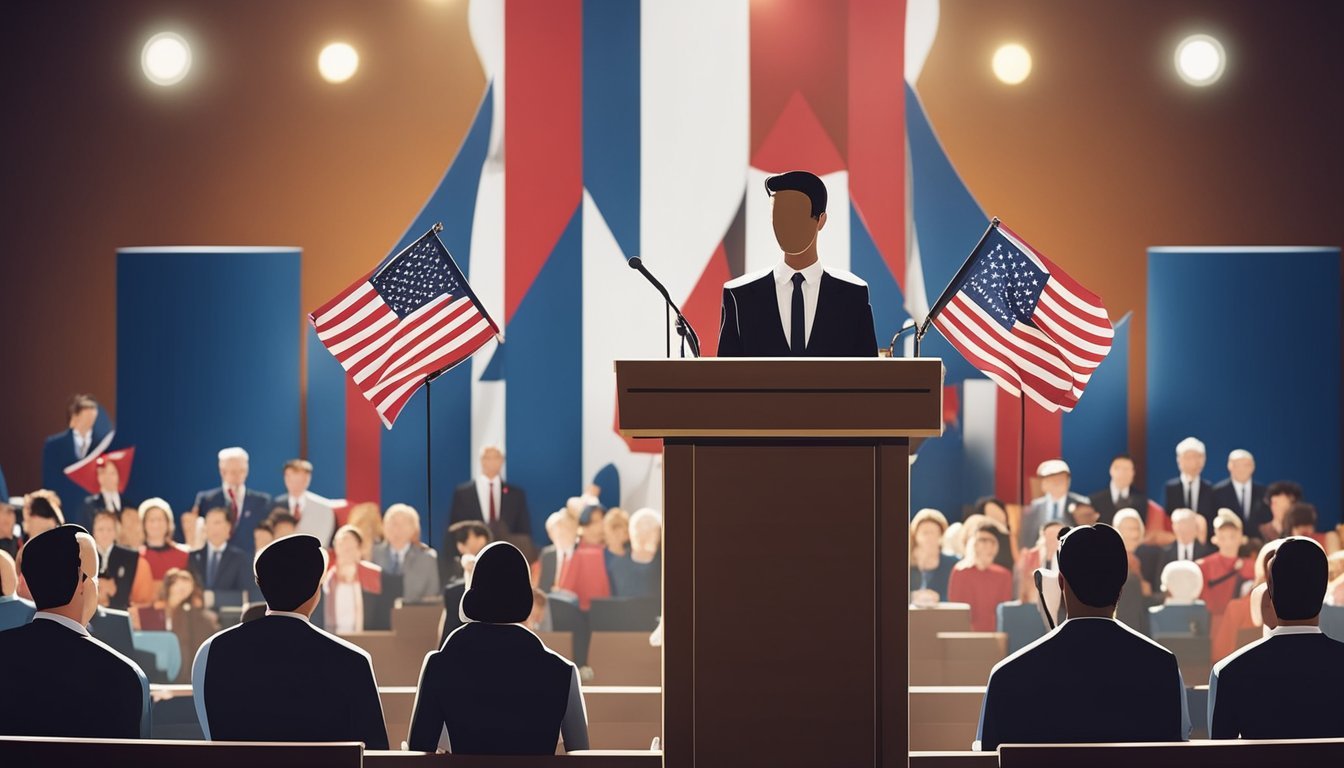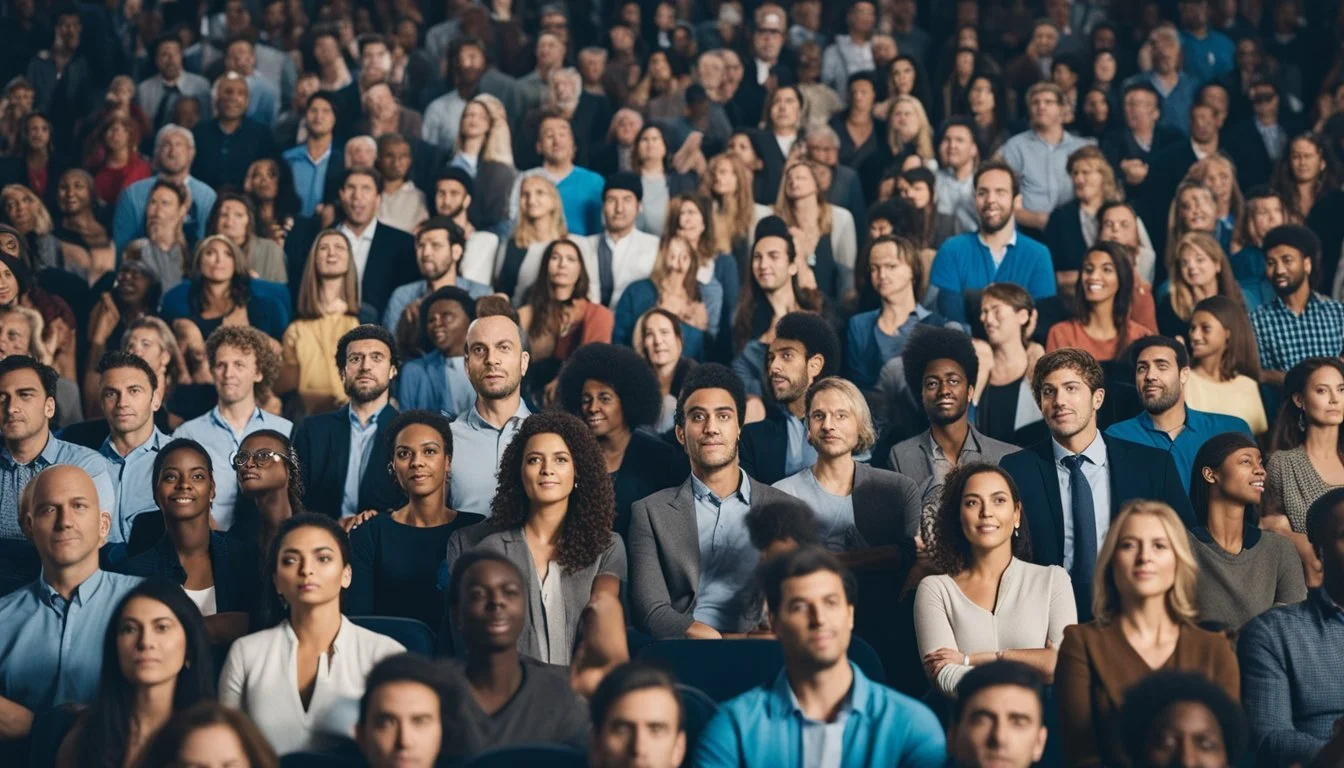9 Films About Political Debates
A Deep Dive into Cinematic Discourse
Political debates have a unique ability to captivate audiences, offering a dramatic insight into the clash of ideologies and the personal stakes involved. As a powerful narrative device, they allow filmmakers to explore complex themes such as justice, power, and public accountability.
The riveting confrontations in these films often reflect real-world tensions, making them both entertaining and thought-provoking. By examining these cinematic portrayals, one can gain a deeper appreciation for the art of debate and the strategies used to influence, persuade, and inspire.
1) The Great Debaters (2007)
"The Great Debaters" is a historical drama directed by Denzel Washington. Set in 1935, the film revolves around the efforts of Melvin B. Tolson, a professor at Wiley College in Texas, to form the school's first debate team.
This team, despite the racial segregation of the Jim Crow South, rises to national prominence. Under Tolson's strict guidance, the Wiley College debate team goes on to challenge Harvard University in a highly anticipated debate.
The film emphasizes the power of perseverance, education, and standing against societal injustices. It highlights the courage and intellect of the all-Black debate team as they contend with racial prejudices.
Starring Denzel Washington, Forest Whitaker, and Denzel Whitaker, the film presents a compelling narrative of triumph against adversity.
2) Lincoln
The second film to consider is Right Makes Might: The Lincoln-Douglas Debates (2020). This documentary explores the famous debates between Abraham Lincoln and Stephen A. Douglas.
Directed by Justin Folk, this film features notable historians like Allen Guelzo, Michael Burlingame, and Lucas E. Morel. The debates marked a turning point, transforming Lincoln from a relatively unknown Illinois lawyer into a national figure.
Lincoln's arguments against slavery highlighted the core principles of the Declaration of Independence, emphasizing that all men are created equal. These debates are not just historical footnotes but pivotal moments that shaped American political discourse.
The documentary is currently available for streaming on Fox Nation and is narrated by Allen Guelzo, a respected Lincoln historian. This film is essential viewing for anyone interested in American history and political debates.
For more information, visit the IMDb page.
3) The Ides of March (2011)
Directed by George Clooney, "The Ides of March" is a gripping political drama showcasing the gritty and cutthroat world of campaign politics. The film adapts Beau Willimon's 2008 play "Farragut North," drawing inspiration from his own experiences in political campaigns.
The cast features notable actors such as Ryan Gosling, George Clooney, Philip Seymour Hoffman, and Paul Giamatti. Gosling plays an idealistic campaign staffer who faces the harsh realities of political maneuvering.
Clooney's direction brings out the intense atmosphere of a presidential campaign. The movie explores themes of loyalty, betrayal, and the moral compromises required to win in politics.
Set during the frantic days before a Democratic primary, the film highlights the pressures faced by campaign staff. It scrutinizes the ethical dilemmas and personal sacrifices that come with the quest for power.
"The Ides of March" received positive reviews for its performances, particularly Gosling and Hoffman, and its incisive look at modern politics. The screenplay, co-written by Clooney, Grant Heslov, and Beau Willimon, effectively captures the behind-the-scenes drama of political campaigns.
For more information on this film, visit The Ides of March on IMDb.
4) Frost/Nixon (2008)
"Frost/Nixon" focuses on the intense 1977 televised interviews between British talk show host David Frost and former U.S. President Richard Nixon. Directed by Ron Howard, the film adaptation is based on the play by Peter Morgan.
Richard Nixon, after resigning from office due to the Watergate scandal, spent two years away from public life. The interviews provided Nixon a platform to attempt to rehabilitate his public image.
David Frost was keen on making a name for himself as a serious journalist in the United States. His determination to hold Nixon accountable drove the interviews, culminating in a dramatic and revealing confrontation.
The movie captures the psychological battle between Frost and Nixon, highlighting the complexities of their interactions. The performances by Michael Sheen as Frost and Frank Langella as Nixon are highly praised, reflecting the high-stakes nature of these interviews.
For more information on the film, you can visit the Frost/Nixon (2008) IMDB page.
5) All the President's Men (1976)
"All the President's Men" is a 1976 political drama directed by Alan J. Pakula. The film is an adaptation of the non-fiction book by Carl Bernstein and Bob Woodward, who were journalists for The Washington Post.
The story centers on the Watergate scandal, which led to the resignation of President Richard Nixon. Robert Redford and Dustin Hoffman portray Woodward and Bernstein, respectively. Their performances are widely acclaimed for their authenticity and dedication.
The movie illustrates the meticulous process of investigative journalism. With a focus on detail and accuracy, it shows how reporters gradually uncover the truth behind the break-in at the Democratic National Committee headquarters.
Jason Robards plays Ben Bradlee, the executive editor of The Washington Post. His role emphasizes the importance of a free press and the ethical standards required in journalism. Robards' performance earned him an Academy Award for Best Supporting Actor.
"All the President's Men" is considered one of the best political thrillers ever made. It provides a gripping and realistic portrayal of the power dynamics and pressures faced by journalists working on high-stakes stories.
More information: IMDb
6) The Candidate (1972)
"The Candidate," directed by Michael Ritchie, is a political comedy-drama film from 1972. Starring Robert Redford and Peter Boyle, the movie explores the complexities of political campaigns.
The film focuses on Bill McKay, played by Redford, a liberal lawyer recruited to run for the U.S. Senate. Initially, McKay has no intentions of winning, but as his campaign gains momentum, he becomes more entangled in the political process.
The screenplay, written by Jeremy Larner, provides an incisive look into the strategies employed in political campaigns. It details how candidates are coached on responses, how debates are staged, and how media plays a role in shaping public perception. McKay's journey from an idealistic outsider to a seasoned politician highlights the often cynical nature of political contests.
"The Candidate" earned critical acclaim for its authentic portrayal of the election process and won an Academy Award for Best Original Screenplay.
For more information on "The Candidate," visit Wikipedia.
7) Primary Colors (1998)
Primary Colors is a 1998 American comedy-drama film directed by Mike Nichols.
The screenplay, written by Elaine May, is adapted from the novel "Primary Colors: A Novel of Politics" by journalist Joe Klein. The story is a roman à clef, offering a thinly veiled portrayal of Bill Clinton's 1992 presidential campaign.
John Travolta stars as Jack Stanton, a charismatic Southern governor who runs for President. Emma Thompson plays his wife, and Kathy Bates is a pivotal campaign worker. The film delves into various political and ethical dilemmas faced during the campaign.
Adrian Lester portrays Henry Burton, a young idealist and grandson of a civil rights leader, who is recruited to join Stanton's campaign. The film provides insight into the behind-the-scenes machinations of American politics.
For further information, please refer to the Wikipedia page for Primary Colors.
8) Mr. Smith Goes to Washington (1939)
"Mr. Smith Goes to Washington," directed by Frank Capra, stars James Stewart as Jefferson Smith. Smith is a naive and idealistic junior senator who faces the harsh realities of political corruption.
Appointed by the governor, Smith's uncompromising integrity challenges the Senate's entrenched corruption. His mentor, played by Claude Rains, gradually reveals his conflicting values.
Jean Arthur co-stars as Smith's savvy secretary, who guides him through the political maze. The film's bold critique of government corruption initially sparked controversy and criticism from some politicians.
Though initially perceived as controversial, it has since become a classic. Additionally, the film showcases Capra's adept direction and Stewart's compelling performance.
For more information on "Mr. Smith Goes to Washington," visit Wikipedia or IMDB.
9) The Contender (2000)
The Contender is a 2000 American political drama film directed by Rod Lurie. It stars Joan Allen as Senator Laine Hanson, who is nominated for Vice President by a fictional United States President, played by Jeff Bridges. The movie addresses issues of gender discrimination and political scandal.
Senator Hanson faces intense scrutiny and hostile questioning during her confirmation process. The opposition's aim is to tarnish her reputation by exposing scandalous information from her past.
Gary Oldman delivers a notable performance as Congressman Shelly Runyon, who leads the opposition. The film is a commentary on the challenges and double standards faced by women in politics.
For those interested in a detailed depiction of political maneuvering and gender issues in high office, The Contender provides a compelling narrative.
More information can be found on IMDb.
Historical Background of Political Debate Films
Political debate films have roots in reflecting real-world political tensions and exploring dynamic ideological conflicts. These films often dramatize pivotal moments that have shaped societies.
Evolution of Political Narratives in Cinema
Beginning in the early 20th century, political narratives in cinema evolved to mirror changing societal landscapes. Films like "Mr. Smith Goes to Washington" (1939) emphasized democratic ideals and political integrity. As decades progressed, the tone became more critical, exploring the darker aspects of politics.
The 1960s and 1970s saw an influx of films addressing civil rights and the Vietnam War, reflecting societal upheavals. By the 21st century, political narratives had expanded to include global issues, evidenced by films like "Frost/Nixon" (2008), which spotlighted significant political scandals.
Influence of Real-World Politics
Real-world politics heavily influences political debate films, providing a rich backdrop for storytelling. Movies like "The Man Who Shot Liberty Valance" (1962) and "The Great Debaters" (2007) recount true events or are inspired by them, grounding the narrative in reality. These films often aim to educate and provoke thought, engaging audiences with authentic political contexts.
Films set against the backdrop of historical events, such as "The Great Debaters," delve into the struggles for civil rights, highlighting the realities of the time. These stories resonate with viewers by connecting historical events with contemporary issues, showcasing the power of cinema to reflect and influence political discourse.
Key Themes Explored in Political Debate Films
Political debate films frequently delve into profound issues such as the principles of democracy, ethical questions, and the intricate power dynamics within societies. These themes are central to understanding the impact and message of these films.
Democracy and Governance
Films addressing democracy and governance often showcase the complexities of democratic systems. For instance, Mr. Smith Goes to Washington dramatizes the idealism of democratic values through a young senator's fight against corruption. The Contender explores the challenges faced by a vice-presidential nominee subjected to intense scrutiny, highlighting the democratic process's fragility. These narratives emphasize transparency, the importance of civic participation, and the struggle for an equitable political environment.
Ethics and Morality
Ethical dilemmas and moral questions form the backbone of many political debate films. A Few Good Men questions military ethics when a lawyer defends Marines accused of murder, uncovering deeper issues of justice and code over rules. Similarly, 12 Angry Men examines prejudice and bias within the judicial system. These films underscore the moral complexity within institutional settings and invite viewers to reflect on justice, duty, and personal responsibility.
Power Dynamics
Power struggles and the quest for influence are critical themes in political debate films. Frost/Nixon portrays the post-Watergate interviews between journalist David Frost and former President Richard Nixon, illustrating the delicate balance of power in media politics. The Ides of March reveals the backdoor manipulations and ethical compromises in political campaigns. These narratives expose the often unseen machinations of power, revealing how authority can be both wielded and contested.
These themes together provide a comprehensive look at the rich tapestry of issues that political debate films explore, making them significant not only as entertainment but also as thought-provoking commentaries on society and governance.
Impact of Political Debate Films on Society
Political debate films can play a significant role in influencing societal perspectives and fostering public discourse. They achieve this through raising awareness and engagement, as well as shaping public opinion on critical issues.
Raising Awareness and Engagement
Political debate films highlight significant sociopolitical issues, bringing them to the forefront of public consciousness. By depicting historical and contemporary political debates, these films introduce viewers to complex political ideologies and conflicts. For instance, movies like "12 Angry Men" showcase the intricacies of the justice system and encourage viewers to think deeply about fairness and prejudice.
These films often feature compelling narratives and strong character development, which can engage audiences emotionally and intellectually. Engaged viewers are more likely to discuss these issues with others, thereby fostering a wider dialogue. Moreover, political debate films can inspire activism and involvement in political processes, motivating individuals to become more informed and active citizens.
Shaping Public Opinion
Films that portray political debates have the power to influence public opinion by presenting various perspectives on critical issues. By dramatizing political arguments, they help audiences see multiple sides of an issue, which can lead to a more nuanced and informed public discourse. For example, "Frost/Nixon" offered insight into the political scandal and its implications, potentially altering viewers' perceptions of political accountability.
The portrayal of political debate in film can sometimes challenge prevailing attitudes and stereotypes, prompting viewers to reconsider their own views. By offering a platform for underrepresented voices and issues, these films can contribute to societal change. In this way, political debate films not only reflect societal views but can also shape and transform them.








